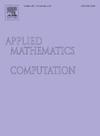Vaccination dilemmas in mitigating monkeypox outbreaks: An imitation dynamics game model approach
IF 3.4
2区 数学
Q1 MATHEMATICS, APPLIED
引用次数: 0
Abstract
The monkeypox epidemic poses a serious global health threat, making effective control strategies essential. Using a mechanistic SEIR (Susceptible-Exposed-Infectious-Recovered) model, this study incorporates both pro- and anti-vaccination attitudes among susceptibles to examine their impact on transmission. Sensitivity analysis via partial rank correlation coefficients (PRCC) identifies key parameters affecting the basic reproduction number (). The model reveals both forward and backward bifurcations, indicating potential for stable infection states and persistent epidemics. To address vaccination behavior, a coupled vaccination game based on imitation dynamics is introduced. Results show that higher imitation rates increase pro-vaccine adoption and reduce infections. The study highlights the role of social dilemmas, where low pro-vaccine uptake and frequent strategy switching worsen outbreaks. High vaccination costs further reduce social payoff, but strong social learning still promotes uptake, even with low susceptibility or high costs. Overall, social learning strategies can enhance vaccination rates and curb monkeypox spread.
减轻猴痘爆发的疫苗接种困境:模仿动力学博弈模型方法
猴痘流行病对全球健康构成严重威胁,因此必须采取有效的控制战略。本研究采用一种机制SEIR(易感者-暴露者-感染者-恢复者)模型,结合易感者中支持和反对接种疫苗的态度,以检验其对传播的影响。通过偏秩相关系数(PRCC)进行敏感性分析,确定了影响基本繁殖数(R0)的关键参数。该模型显示了向前和向后分叉,表明可能存在稳定的感染状态和持续的流行病。为了解决疫苗接种行为问题,引入了一种基于模仿动力学的耦合疫苗接种对策。结果表明,较高的仿制品率提高了原疫苗的采用率,减少了感染。该研究强调了社会困境的作用,在这种情况下,支持疫苗的低摄入量和频繁的策略转换加剧了疫情。高昂的疫苗接种成本进一步降低了社会回报,但强大的社会学习仍能促进接种,即使易感性低或成本高。总体而言,社会学习策略可以提高疫苗接种率并抑制猴痘的传播。
本文章由计算机程序翻译,如有差异,请以英文原文为准。
求助全文
约1分钟内获得全文
求助全文
来源期刊
CiteScore
7.90
自引率
10.00%
发文量
755
审稿时长
36 days
期刊介绍:
Applied Mathematics and Computation addresses work at the interface between applied mathematics, numerical computation, and applications of systems – oriented ideas to the physical, biological, social, and behavioral sciences, and emphasizes papers of a computational nature focusing on new algorithms, their analysis and numerical results.
In addition to presenting research papers, Applied Mathematics and Computation publishes review articles and single–topics issues.

 求助内容:
求助内容: 应助结果提醒方式:
应助结果提醒方式:


